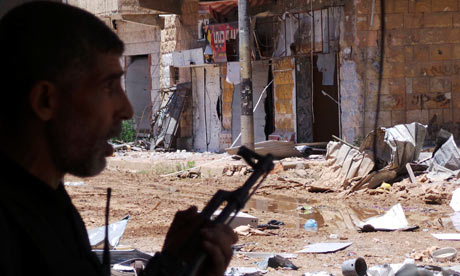
Think Syriasly
 In early June, President Obama verified that Washington would send arms to the Free Syrian Army – just another headline with little information about White House strategy or long-term expectations. Arab pundits responded with some alarm: “Obama just stepped into a pile of old Sunni shit,” one Arab friend commented, “and U.S. shoes will carry that malodorous scent for some time.”
In early June, President Obama verified that Washington would send arms to the Free Syrian Army – just another headline with little information about White House strategy or long-term expectations. Arab pundits responded with some alarm: “Obama just stepped into a pile of old Sunni shit,” one Arab friend commented, “and U.S. shoes will carry that malodorous scent for some time.”
“Why?” he asked, “to diminish Iranian influence? Spread democracy alongside Saudi Arabia and Qatar? Hasten the overthrow of President Bashar al Assad?”
If the rebels begin to recapture territory and influence that President Assad has just won, militarily, what does Washington gain?
Assad, now commonly known in the media as the “brutal dictator,” once agreed to take some of Washington’s Syrian-born suspects and torture them. He also tipped off U.S. officials to plots against U.S. targets in the region. His record on practicing democracy is bad and he has bombed his own people mercilessly in the current conflict. But we should also see the less bright side of the Free Syrian Army.
In 2004, while filming “Syria, Between Iraq and Hard Place,” I had an ‘off-the-record’ interview with a Sunni Imam from Hama, where Roman water wheels still churn. “When the majority finally seize control of our country,” he explained, “all the heathens (Christians) will return to the heathen country (Lebanon).”
And the Alawites? (The Shia sect of the Assad family), I asked.
“They’ll get what’s coming to them.”
Members of the Free Syria Army have already attacked and even massacred Christian and Alawite villages, according to friends living in northwest Syria. Videos show the killings of unarmed men, getting their throats cut, or shot by Free Syrian Army members. And now Obama supplies them with arms – in the name of freedom?
Another FSA contingent shot 25 Christians in a Damascus church.
Alawites and Christians have good reason to fear the consequences of a rebel victory. They care little about diminishing Iranian influence or spreading democracy. But U.S. arms will find their way into Jihadist sectors of the FSA, and U.S. intervention in this region will exact a long term cost, not just ill will from Assad and his backers.
Millions of Syrians still back the regime. They recall that over centuries, Syria has experienced war and conflict. Any tourist who visits the country will see the Krak des Chevaliers, first inhabited in the 11th century by a settlement of Kurds. In the ensuing wars and centuries the castle was occupied by a series of rulers.
The very history of this castle and the wars fought to occupy it should be enough to teach Obama’s advisors what Syria already knows about: war and its wretched consequences.
The elder and the younger Under Assad won approval from millions of Syrians because they guaranteed freedom of religion, all sects of Muslims and Christians could worship freely. Even a few Jews remain in Damascus without fear of persecution. For Obama to supply weapons to the Free Syrian Army, backed by Qatar and Saudi Arabia, involves the United States in ancient sectarian disputes that he knows little about. It also involves the United States in a modern conflict, in which it defines Iran as its primary foe.
Why should the United States ally itself with committed non-democracies like Qatar and Saudi Arabia? Why would Washington want to supply arms to rebel groups that have already committed atrocities? Why would we ally ourselves with royal kingdoms that eschew democracy and have poor human rights records?
Modern Syria is a history of war. If one travels from the north, on the Turkish border, south to the Golan Heights where the Israeli military occupy the other side, one sees a country whose conflicts should repel foreign intervention, rather than encourage it. In the town of Maaloula (Ma’loula), the population still speaks Aramaic, the language of Jesus. Some 100 hundred miles north, one sees the remnants of the palace King Solomon built for the Queen of Sheba.
Near the Iraqi border, one visits Palmyra, one of the largest preserved Roman ruins. They came, they conquered, they have become a tourist site.
What good can come from Obama’s supplying weapons in the latest war? More death, more instability for other people. Did Iraq and Afghanistan not teach those lessons?
Syria’s history goes back thousands of years. A Roman amphitheater in Bosra, two hours south of Damascus, speaks of the conquest of the Roman Empire as do the remnants of columns and buildings throughout the country. War and conquest is Syria’s history.
Think ‘Syriasly,’ I recommend, and limit U.S. involvement in a country born in conflict we know little about and from which we could suffer serious losses.

